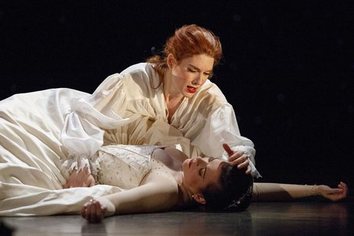 Lebel and Kriha Dye in Orpheus et Eurydice.
Lebel and Kriha Dye in Orpheus et Eurydice. The version presented was an unusual hybrid: Hector Berlioz’s 1859 arrangement of Gluck’s 1762 opera (incorporating Gluck’s 1774 revisions), but performed on baroque instruments by the Tafelmusik Orchestra. And if it was neither fish nor fowl, it was a lovely creature in its own right.
With a cast of just three characters – Orpheus, Eurydice and Amour – the singers were constantly exposed, and any weak link in the chain would have been painfully apparent. Happily, there were none.
As Orpheus, mezzo Mireille Lebel has just the kind of clear and fluid voice that suited her character – with intonation and diction that were spot-on. While never going “over the top” in her emotional delivery, she displayed an effective range, from devoted love and energetic resolve to deep regret in the famous aria “J’ai perdu mon Eurydice.” Her manly mannerisms (she was portraying a guy with a very healthy ego) were an engaging theatrical conceit. And her stamina in this big role was impressive.
Soprano Peggy Kriha Dye brought a more complex voice to the role of Eurydice. Her delivery was beautiful in a lush and billowy way: in contrast to Orpheus, she was all tenderness and vulnerability. And soprano Meghan Lindsey was all sweetness as Amour, singing prettily and enlivening every scene she appeared in.
In the pit, conductor David Fallis kept the Tafelmusik Orchestra firmly under control. Under his baton, the band’s playing was tight, balanced and homogenous.
Dance is a feature of every Opera Atelier production – but here it was especially prominent. With the production’s mixed parentage in mind, choreographer Jeannette Lajeunesse Zingg blended elements from classical and romantic styles. She even introduced a touch of Broadway schtick in the final scene, as her corps de ballet spelled out the opera’s title with giant letters.
One last thing: before the opening curtain, Pynkoski stepped forward (as is his wont) to talk about some of the recent and upcoming accomplishments of his company. Among these was an announcement that OA’s recent La Scala performances of Mozart’s Lucio Silla will be released on DVD. This company’s work should be widely shared with the world – and DVDs are exactly what’s needed.
© Colin Eatock 2015
 RSS Feed
RSS Feed

